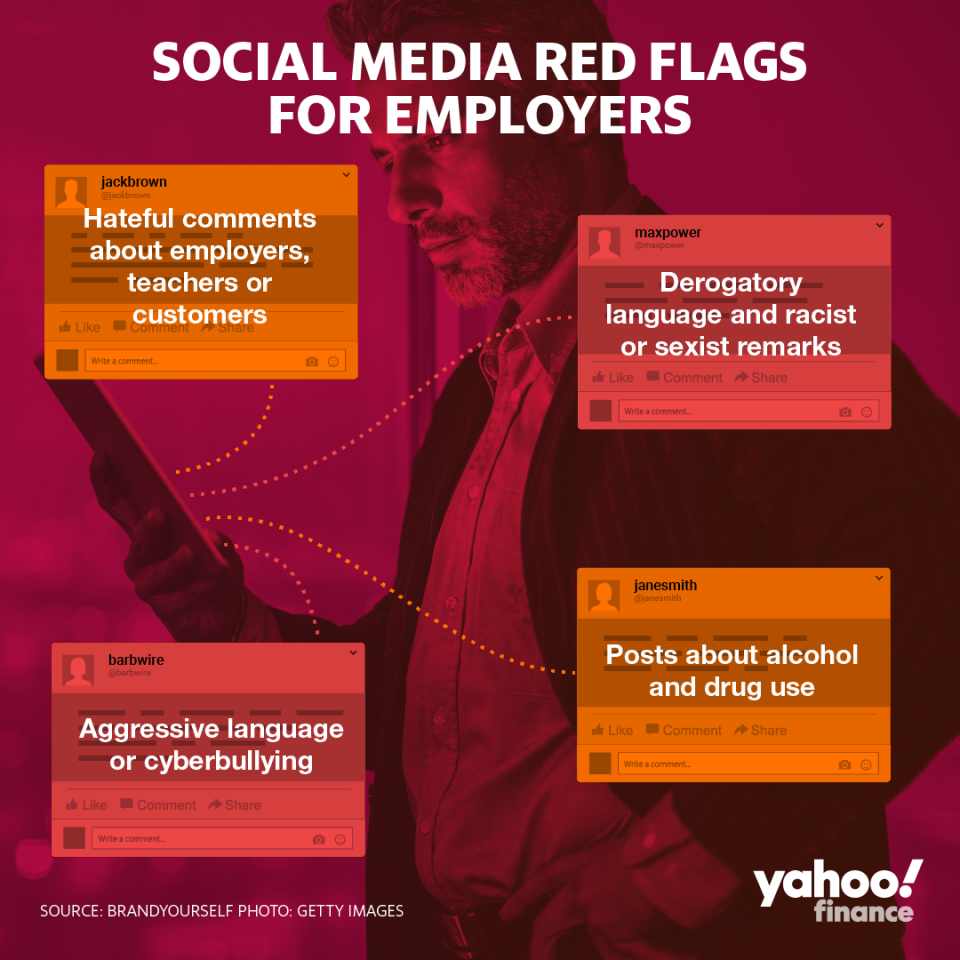Survey highlights a key consideration before applying for your next job
Reputation management sounds like a service that only a high-profile politician or a movie star actor would pay for. But even job applicants who aren’t under the limelight should consider it.
Seven in 10 employers check potential hires’ social media presence, according to a CareerBuilder survey from last year. Of those, almost 3 in 5 employers found content that turned them off from a candidate altogether.
Erasing your online footprint entirely isn’t an ideal solution either for job-hunters. Almost half of employers are less likely to schedule an interview with a candidate who doesn’t have any presence online.
Your “online presence is now your resume,” Patrick Ambron, CEO of BrandYourself, an online reputation management company with about one million clients, told Yahoo Finance. “Online screening is skyrocketing.”

What is reputation management?
Reputation management removes negative online search results about you. It can also help enhance your online visibility as a job candidate. The service typically includes social media clean-up, prioritizing positive Google search results, and protecting private information.
Ambron started his New York-based company after Pete Kistler, his co-founder, had trouble getting an internship because he shared the same name with a drug dealer. Unfortunately, the dealer rather Kistler himself showed up at the top of the search results for his name.
Kistler learned how to make results pertaining to him more search engine friendly so that they rise up and surpass the negative results. After months of effort, he buried the drug-dealer’s results off the first page.
That’s just one reason candidates decide to invest in their online presence, Ambron said. Some job hunters have been victims of online rumors, criticism, and even revenge porn. Others simply use the service to improve their online presence and search results, potentially helping them get a job.
What does an online makeover include?
BrandYourself, which serves clients of differing ages and job experience, offers several tiers of services. Its basic do-it-yourself online service, which includes a social media scan or improving search results, runs between $20 and $100. The company also offers a more personalized approach for more complicated issues like being a victim of revenge porn that starts at $3,000 per year.
Users can submit content they want employers to see, like specific social media posts or a portfolio website and the company helps you make these results more search-friendly. The company also identifies content that employers could find problematic that you should remove from your social media.

The cost of a basic package at ReputationX, a company that caters to senior executives or entrepreneurs starting their own business, ranges from $3,000 to $8,000 a month. It includes services like image analysis, reputation strategy and positive content development.
“We know what Google likes,” said Kent Campbell, managing director of Reputation X. “And what we’ll do is post content that is really positive, and then we’ll promote it in search results, so it rises.”
Campbell calls this “genetically-modified content” and it’s used to suppress negative results. Some content is hard to be moved from the top page – such as an article from a major news outlet – this costs even more, up to $10,000 to $20,000 a month.
The company also will try to remove content that includes false information or allegations from the search results altogether. ReputationX may even contact a publisher or journalist to get an article with incorrect information taken down.
‘They're searching social media to verify’
Could an online makeover give you higher chances of landing the dream job than a killer resume and cover letter? It depends.
The resume, cover letter, and applicant’s online presence are “equally as important,” said Tony Lee, a vice president at the Society for Human Resource Management, an association for HR professionals.
Employers may also use an online search to help root out any exaggerations or inconsistencies on your resume, which could ultimately cost you the job, Lee said.
But Lee discourages individuals to pay a firm to manage or clean up their online reputation. Instead, a candidate should present an honest, thorough overview of their skills and abilities.
“Otherwise, they’re trying to hide something that employers likely will find out about anyway,” he said, “and job hunters will save the cost of the consulting firm.”
A negative online result is not necessarily the end of your candidacy, either. Employers often give potential hires the chance to explain a problematic social media post or search result, Lee said. If the applicant has a reasonable explanation, the employer will likely overlook it.
“Companies are not searching social media looking to hire people,” Lee said. “They're searching social media to verify the backgrounds of people who they've already found.”
Denitsa is a writer for Yahoo Finance. Follow her on Twitter @denitsa_tsekova.
Read more:
Follow Yahoo Finance on Twitter, Facebook, Instagram, Flipboard, SmartNews, LinkedIn, YouTube, and Reddit.

 money
money 
